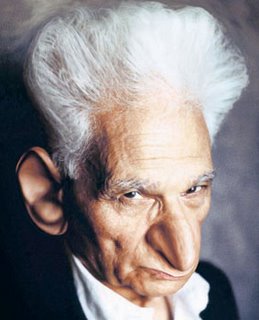Given the continual pain I've been in for the last 3 weeks, which won't end for another 3, thanks to marking, I thought I'd quickly rip into Alfie Kohn. Kohn is an edumacation guru and "whole child" teacher. In his article,
The Trouble with Rubrics, he seems to think that marking should be endless, inefficient, and have no point. The only way I can fathom that someone could hold such a belief is that they are sadistic and actually enjoy marking; the less point to it, the better.
I'll start with the pointlessness of marking. Note that Kohn claims he doesn't think in "
black and white" anymore… yeah right!
Once upon a time I vaguely thought of assessment in dichotomous terms: The old approach, which consisted mostly of letter grades, was crude and uninformative, while the new approach, which included things like portfolios and rubrics, was detailed and authentic. Only much later did I look more carefully at the individual floats rolling by in the alternative assessment parade -- and stop cheering.Whilst I agree with him on this point, that the "new approach" is not necessarily better than the "old approach". I find it strange that someone who is past dichotomous thinking goes on to say:
…I’d been looking for an alternative to grades because research shows three reliable effects when students are graded: They tend to think less deeply, avoid taking risks, and lose interest in the learning itself. The ultimate goal of authentic assessment must be the elimination of grades.Apparently authentic assessment and grades are mutually exclusive, or did I not read that right or something? Kohn sets up a
False Dilemma - we can't have both authentic assessment and grades. If that's the case, how are we to demarcate between those who know stuff, and those who don't? If we follow Kohn's advice we assess students but don't demarcate between work of high quality, good quality, satisfactory quality, poor quality, and so on. I'm guessing now, but perhaps he doesn't want a grade for each assessment item, but rather, an essay of feedback, to help students improve? I'm all for assessment for learning, but I'm quite sure that the fulcrum of assessment is to judge the quality of something. Assigning a mark is the shortcut way of reporting on the assessor's assessment. It should be possible for the assessor to justify their decision, but the mark makes it easy for the rest of us to quickly gauge the quality of something. Eg, I'm going into some detail now, explaining why Kohn's work in general is crap, but if I just give it a C+, you get the picture (I'm an easy marker!).
Now, he does make some good points with respect to rubrics and criteria, but if anything it leads me to say let's go back to standardised external exams - much less marking for me… Oh, in Kohn's book, that would make me despicable. Fancy not wanting to spend my entire life marking:
… there’s the matter of that promise to make assessment “quick and efficient.” I’ve graded enough student papers to understand the appeal here, but the best teachers would react to that selling point with skepticism, if not disdain.Again, more dichotomous thinking from Kohn, topped off with a pre-empted
impugning of motives (I must not be one of the "best teachers" then). Why can't marking be quick, efficient, and authentic? The answer must be that slow and arduous marking ensures authenticity… well if that's the case, everything I'm currently marking is highly authentic indeed.
Now, back to some pointless fun.
 I haven't posted for a while so I feel guilty about leaving the running to Theo. Best solution is to whip up a gratuitously mocking distortature. It's fun, it's easy, and as it happens, the portrait relates to the previous post - so it seems relevant and timely.
I haven't posted for a while so I feel guilty about leaving the running to Theo. Best solution is to whip up a gratuitously mocking distortature. It's fun, it's easy, and as it happens, the portrait relates to the previous post - so it seems relevant and timely.











